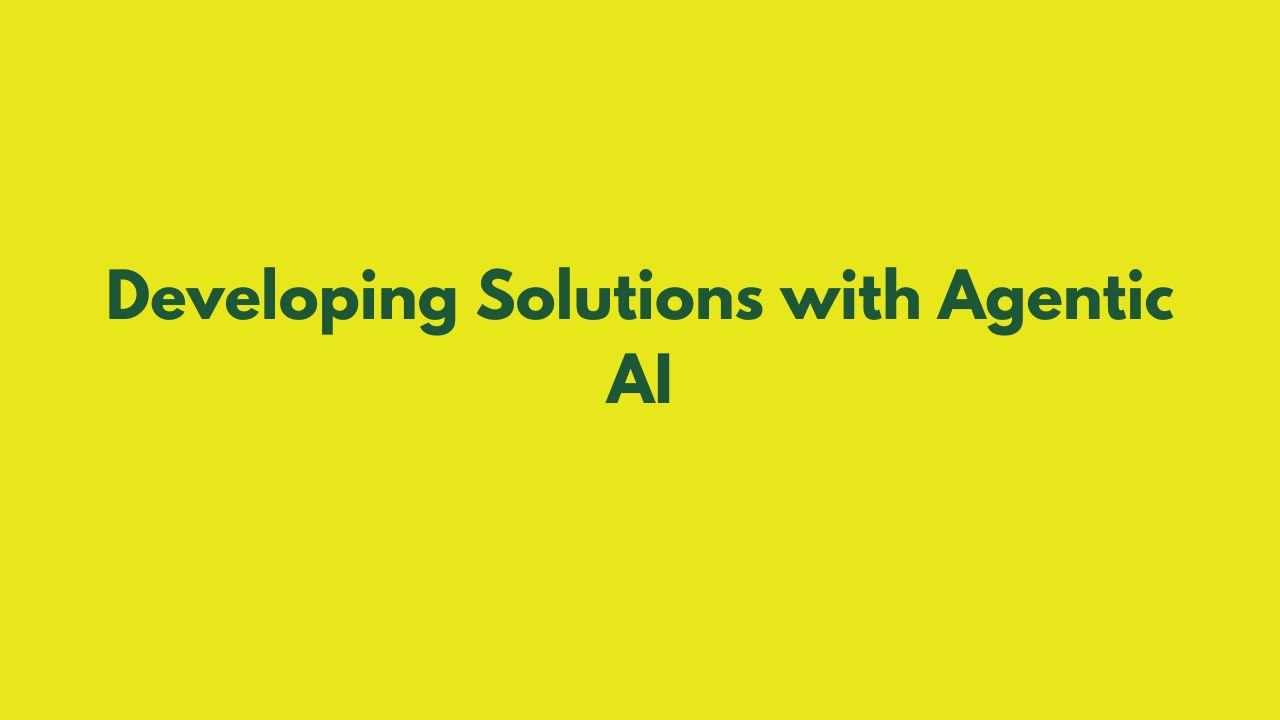
Course Title: Developing Solutions with Agentic AI #
Course Outline #
Module 1: Introduction to Agentic AI #
-
1.1 Understanding Agentic AI
- Definition and key concepts.
- Difference between agentic and traditional AI systems.
- Real-world examples of agentic AI.
-
1.2 The Rise of Agentic AI
- Evolution from reactive to proactive AI systems.
- Trends and advancements in AI autonomy.
-
1.3 Importance of Agentic AI
- Benefits of agentic AI in various industries.
- Ethical considerations and potential risks.
Module 2: Foundations of AI Agents #
-
2.1 Core Components of AI Agents
- Perception: Sensing and understanding the environment.
- Decision-making: Planning and executing tasks.
- Action: Interacting with the environment.
-
2.2 Agentic Architectures
- Reactive agents.
- Goal-oriented agents.
- Utility-based agents.
- Learning agents.
-
2.3 Multi-Agent Systems
- Collaboration and competition between agents.
- Swarm intelligence and distributed decision-making.
Module 3: Building Blocks of Agentic AI #
-
3.1 AI Technologies Enabling Agency
- Reinforcement learning.
- Natural language processing (NLP).
- Computer vision.
- Generative AI.
-
3.2 Toolkits and Frameworks
- Introduction to OpenAI’s GPT models and APIs.
- Using LangChain for multi-agent systems.
- Integration with robotics, IoT, and APIs.
-
3.3 Hands-On Setup
- Setting up development environments.
- Creating simple autonomous agents.
Module 4: Applications of Agentic AI #
-
4.1 Industry Use Cases
- Customer support chatbots.
- Autonomous supply chain management.
- Personal assistants and task automation.
-
4.2 Business Case Analysis
- ROI from implementing agentic AI.
- Competitive advantages and scaling AI systems.
-
4.3 Customization and Deployment
- Tailoring agent behavior to specific business needs.
- Deployment strategies for production environments.
Module 5: Ethical and Societal Implications #
-
5.1 Responsible AI
- Bias and fairness in autonomous decision-making.
- Transparency and accountability in agent behavior.
-
5.2 Regulatory Compliance
- Current regulations and standards for AI systems.
- Preparing for future legal challenges.
-
5.3 Mitigating Risks
- Avoiding over-reliance on autonomous agents.
- Managing unintended consequences.
Module 6: Advanced Topics in Agentic AI #
-
6.1 AI-Driven Self-Improvement
- Agents capable of continuous learning.
- Feedback loops for optimization.
-
6.2 Multi-Agent Collaboration
- Designing complex systems with multiple interacting agents.
- Managing conflict and cooperation.
-
6.3 AI and Human Collaboration
- Augmenting human capabilities with agentic AI.
- Hybrid systems for decision-making.
Module 7: Capstone Project #
- Participants work in teams to develop and deploy an agentic AI solution tailored to a real-world problem within their industry.
Module 8: Future Trends and Continuous Learning #
-
8.1 Emerging Technologies
- The intersection of Agentic AI and GenAI.
- AI with emotional intelligence.
-
8.2 Building a Learning Organization
- Tools and resources for staying up-to-date with AI advancements.
- Encouraging experimentation and innovation.
Training Methods #
- Interactive lectures and discussions.
- Hands-on workshops and labs.
- Case studies and group projects.
- Guest speakers from AI-focused industries.
Duration #
- 5 Days (Flexible depending on depth of coverage per module).
Expected Outcomes #
- A strong grasp of agentic AI fundamentals and applications.
- Hands-on experience in developing and deploying AI agents.
- Enhanced understanding of ethical and strategic considerations.
- A roadmap for implementing agentic AI within your organization.
Prerequisites #
General Prerequisites #
-
Basic Understanding of AI Concepts
- Familiarity with terms like machine learning, deep learning, and artificial intelligence.
- Awareness of common AI applications.
-
Programming Knowledge
- Intermediate proficiency in Python (e.g., working with libraries, creating scripts).
- Familiarity with Jupyter Notebook is a plus.
-
Problem-Solving Skills
- Ability to break down complex problems into manageable components.
- Experience working on structured projects or workflows.
Technical Prerequisites (nice to have) #
-
Mathematics and Statistics
- Fundamental knowledge of linear algebra, probability, and basic calculus.
- Understanding concepts like optimization and regression.
-
Machine Learning Basics
- Familiarity with supervised and unsupervised learning.
- Understanding concepts like neural networks and reinforcement learning (helpful but not mandatory).
-
Software Tools
- Experience with AI libraries like TensorFlow, PyTorch, or scikit-learn (preferred).
- Familiarity with Docker or virtual environments for software setup.
Team and Infrastructure Requirements #
-
Team Member Roles
- At least one participant familiar with software engineering or data science.
- Others can have domain expertise to provide context for real-world applications.
-
Hardware/Software Setup
- Laptops with at least 16GB RAM (32GB recommended for training with large datasets).
- GPU support for deep learning tasks (if possible).
- Pre-installed software:
- Python 3.8+.
- Development environments (e.g., PyCharm, VSCode).
- Libraries like NumPy, Pandas, Matplotlib, LangChain, and OpenAI API.
Infrastructure / Platform Required #
Choosing the right platforms for an Agentic AI Training course is crucial for hands-on learning and scalability. Here’s a curated list of platforms that can support your training effectively:
1. Cloud-Based Platforms #
These platforms are ideal for scalable computing resources, especially for AI and machine learning tasks requiring GPUs or TPUs.
- For free GPU/TPU: Google Colab
- For deployment
- AWS SageMaker
- OR Azure Machine Learning / Azure AI Foundary
- OR Google Vertex AI / Gemini AI 2.0
2. Development Frameworks and Libraries #
Essential for coding and experimenting with agentic AI.
Stable-Baselines3 #
- A library for reinforcement learning with pre-built algorithms. Stable-Baselines3
- Scalable framework for training distributed AI agents. Suitable for advanced multi-agent system projects. Ray/RLlib
4. Visualization and Testing Tools #
To visualize and test agentic AI behaviors in real-time.
- Offers a 3D simulation environment for testing agents in virtual worlds. Unity ML-Agents
- Simplifies the creation of interactive dashboards to visualize agent performance. Streamlit
- Provides real-time monitoring of agent training and performance metrics. TensorBoard


Comments: